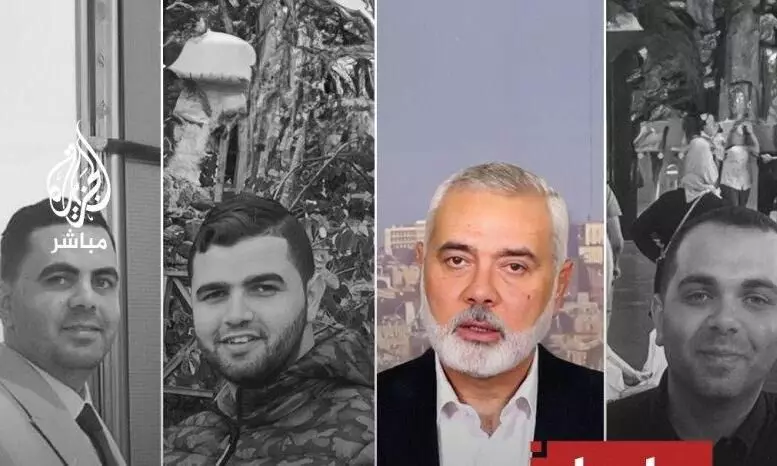
Killing of sons does not deter Hamas from truce demand: Ismail Haniyeh
text_fieldsThe exiled political chief of the Hamas leader Ismail Haniyeh reiterated his stand on a permanent ceasefire in Gaza, emphasizing that the killing of his sons and grandchildren in a targeted bombing by Israel does not deter him from his demand against the desire of Israel.
The strike, which targeted a vehicle in the Shati refugee camp in northern Gaza, claimed the lives of Hazem, Amir, and Mohammed, along with other family members.
The latest incident adds to the previous killings of Haniyeh's family during the ongoing conflict, bringing the total number of relatives lost to 60. This includes 14 who perished in a previous airstrike on their family home in Gaza City.
Despite the personal tragedy, Haniyeh remains resolute in Hamas's demands for a permanent ceasefire and the return of displaced Palestinians to their homes.
The Israeli military has confirmed the airstrike, describing Haniyeh's sons as "Hamas operatives" allegedly en route to carry out terrorist activities. This event underscores the entrenched animosity between Hamas and Israel, further complicating efforts for peace and reconciliation.
In response to the escalating violence, U.S. President Joe Biden has expressed concerns over Israel's actions in Gaza, labelling them a "mistake" and calling for a ceasefire. Biden's remarks signal a shift in U.S. policy, which previously emphasized Hamas's responsibility to agree to a truce.
The president's stance reflects growing international pressure to address the humanitarian crisis unfolding in Gaza, where over 33,400 people have lost their lives, and the majority of the population has been displaced.
Efforts to negotiate a ceasefire have faced numerous obstacles, with ground battles raging in several areas of the strip and truce talks faltering. The situation is compounded by disagreements over key issues, including the return of Palestinians to northern Gaza and Israel's plans for a ground offensive in the city of Rafah.
Meanwhile, tensions have escalated regionally, with Israel and Iran engaging in a war of words following the killing of Gen Mohammad Reza Zahedi, a senior figure in Iran's Islamic Revolutionary Guards. Iran has vowed to retaliate against Israel, raising fears of a broader regional conflict.
Amidst the turmoil, humanitarian organizations like World Central Kitchen are working to provide aid to Gaza's beleaguered population. However, their efforts have been hampered by the volatile security situation, including the targeting of aid convoys.
As the conflict enters its sixth month, the toll on civilians continues to mount, and the prospect of a lasting peace remains elusive.
The international community faces mounting pressure to intervene and broker a ceasefire, but the entrenched hostilities and deep-seated grievances between the parties involved present formidable challenges.























